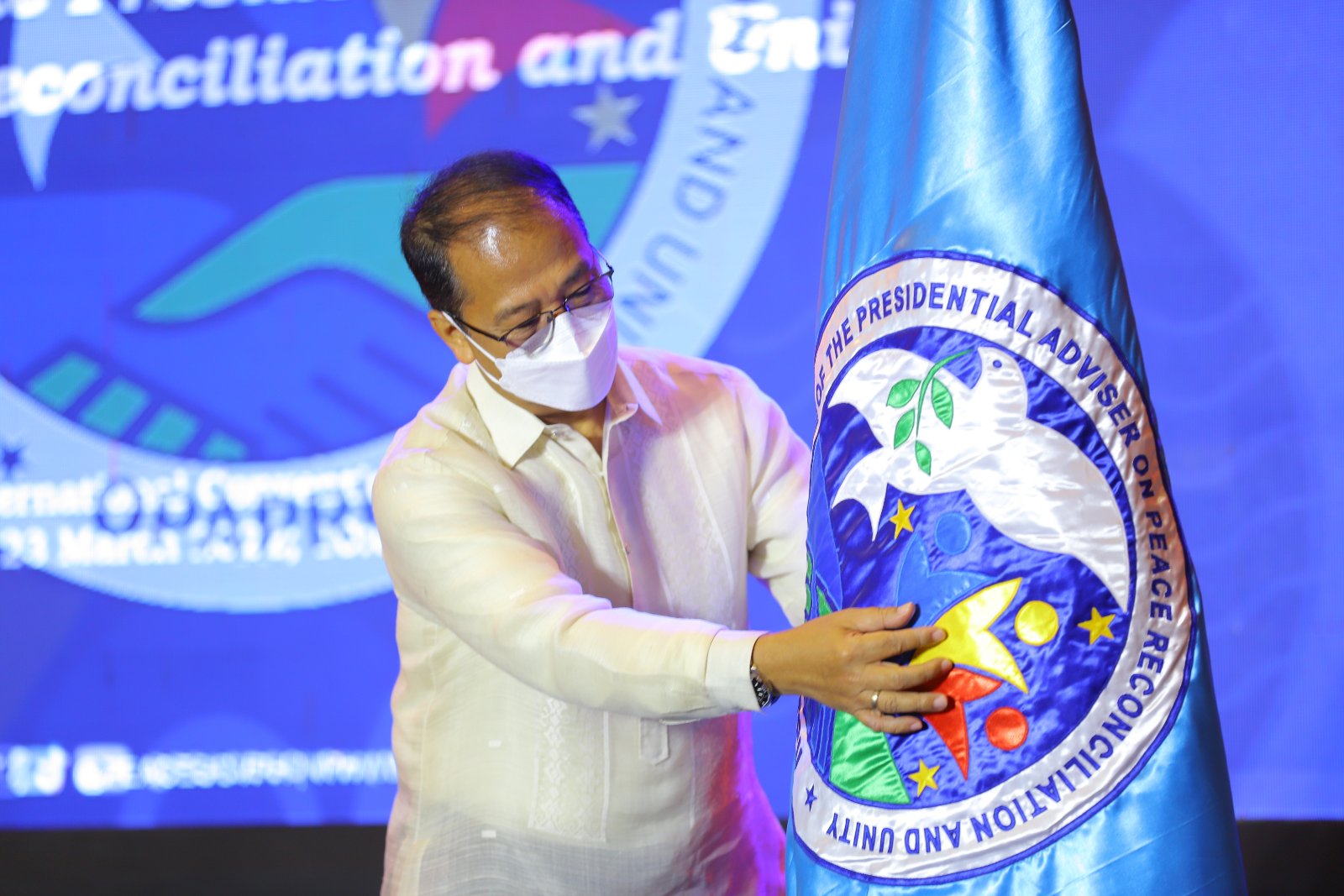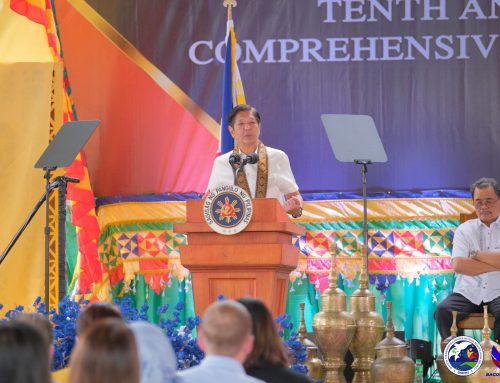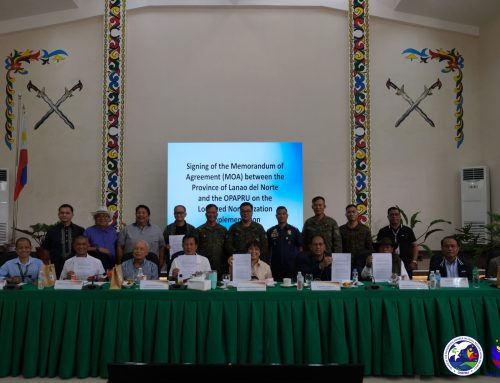PICC, PASIG CITY (23 March 2022) – In a bid to preserve and sustain the Duterte Administration’s legacy of peace in the country, the Office of the Presidential Adviser on Peace, Reconciliation and Unity (OPAPRU) was officially launched here on Wednesday.
Formerly known as the Office of the Presidential Adviser on the Peace Process (OPAPP), the OPAPRU was created by virtue of Executive Order 158 signed by President Rodrigo Duterte in December of last year.
“With its new name and expanded mandate under EO 158, which was officially renamed and reorganized the OPAPP into OPAPRU, our organization is not only focused on fulfilling the national government’s commitments under all signed peace agreements, but is also fostering reconciliation and unity among our people,” said Presidential Peace Adviser Sec. Carlito G. Galvez, Jr. in his remarks during the agency’s launch.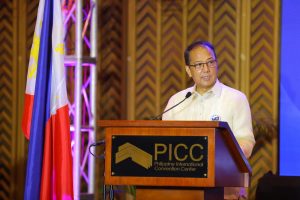
According to Galvez, the agency is determined to preserve the gains of the comprehensive Philippine peace process by helping to transform former rebels and their families into peaceful and productive members of society, while turning once conflict-affected areas into show windows of peace and development.
With the successful implementation of the peace processes with the Moro Islamic Liberation Front (MILF), Moro National Liberation Front (MNLF), Cordillera Bodong Administration – Cordillera People’s Liberation Army (CBA-CPLA), and the Rebolusyonaryong Partido Manggagawa-Pilipinas/Revolutionary Proletarian Army/Alex Boncayao Brigade-Tabara Paduano Group (RPM-P/RPA/ABB-TPG), he emphasized the need for OPAPRU to go beyond the signed peace agreements and find innovative ways to build on the gains achieved under the peace tables.
“All the peace negotiations have been completed and there is a need for the expanded development of the organization in order to execute and implement these signed agreements. During the State of the Nation Address (SONA) of the President, he committed that the signed peace agreements will be honored and implemented,” he said.
“And with that marching order, we saw our need to expand so that we can cover the building blocks of rehabilitation, and reconciliation, including the unification and harmonization of those communities affected by armed conflict,” Galvez added.
Under EO 158, the OPAPRU has three major objectives: embedding peace, reconciliation and unity in the social fabric; enhancing resilience for peace; and pursuing social, economic, and political reengineering.
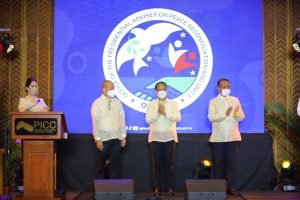 Whereas before, the peace adviser only advised the president in the management, direction and supervision of the comprehensive peace process, the Presidential Adviser on Peace, Reconciliation and Unity (PAPRU) will now be tasked to manage, direct, integrate and supervise, on behalf of the President, all aspects of the comprehensive peace process, including initiatives that promote and reinforce national reconciliation and unity.
Whereas before, the peace adviser only advised the president in the management, direction and supervision of the comprehensive peace process, the Presidential Adviser on Peace, Reconciliation and Unity (PAPRU) will now be tasked to manage, direct, integrate and supervise, on behalf of the President, all aspects of the comprehensive peace process, including initiatives that promote and reinforce national reconciliation and unity.
The PAPRU shall also ensure that there will be greater convergence among different line agencies in the implementation of peace and development initiatives, which are anchored on a whole-of-nation, whole-of-society approach mandated under Executive Order No. 70.
“We change how we think as an organization and how we behave, and at the same time, look into the processes that we need to do — from negotiation to mediation, towards rehabilitation and reconstruction and the building of reconciliatory avenues, and finally, the creation of harmonious relationships,” Galvez explained.
The peace adviser envisions the OPAPRU to become as a “one stop shop” that will take the lead in synergizing and integrating the peacebuilding and development interventions of the various line agencies.
“We have the same concept with the Columbian government. We have eight core agencies that will be working together so that we can achieve our objective of poverty in conflict affected areas, raise the human development index, and strengthen peace and security efforts in communities,” Galvez said.
He pointed out that the OPAPRU’s functions will not be a duplication of the work being done by other line agencies, and will in fact channel its efforts in increasing complementation among them.
As a member of the cabinet’s Security, Justice and Peace Coordinating Cluster (SJPCC) and the Inter-Cabinet Cluster Mechanism on Normalization (ICCMN), Galvez said the OPAPRU has been able to both support and help enhance the delivery of the peace-related programs of other member-agencies.
“The interventions of OPAPRU are not redundant because they are designed to be complementary and integrated with the initiatives of other agencies in consonance with EO 70, EO 79 and the SJPCC,” he said.
The peace adviser likewise highlighted the transformation that is taking place in the organization.
“OPAPRU is not only committed to transforming the lives of its beneficiaries, their families, and communities. It is also transforming itself as an organization from the inside out and vice-versa,” Galvez said.
“In order to achieve this, OPAPRU shall focus on improving the agency’s business systems, processes, and procedures in order to more effectively and efficiently implement its programs and projects,” he added.
Moving forward, Galvez underscored the need for the agency to integrate and harmonize the various initiatives it is carrying out under the various peace tables and align them towards one conflict line.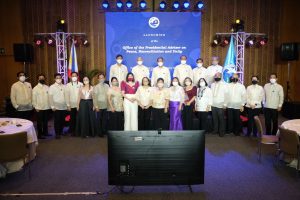
“By doing this, all our interventions will support, complement and strengthen each other, and as a result, boost their impact on our nation’s peace, security and development, and improve the socio-economic well-being of our countrymen,” he said.
Galvez is optimistic that the next administration will continue to implement the peacebuilding policies and initiatives started under the term of President Duterte.
“I am very confident that the next administration will prioritize the peace process and will be implementing the good legacy of the Duterte administration,” he said. ###


